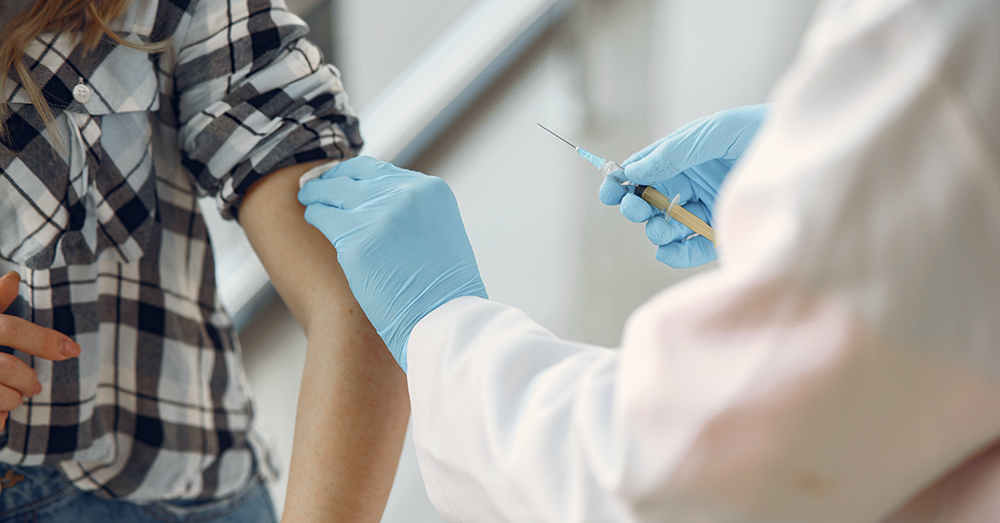COVID-19 Vaccine Safety During Pregnancy: A Year-End Update

Throughout the unpredictable course of this pandemic, there have been several aspects of both the virus and the vaccines that have left people weary, putting researchers and health care professionals on a constant quest for current data.
At Texas Tech University Health Sciences Center (TTUHSC), several of our experts have spoken about pregnancy during the pandemic, addressing common questions surrounding the vaccines. Here’s what we know as 2021 comes to a close.
Pregnancy and COVID-19: Health Complications

Todd Bell, M.D., a Pediatrics Specialist with Texas Tech Physicians and public health authority for the City of Amarillo, said that the primary risk lies in the virus itself, not the vaccine.
“There is data now that COVID itself causes an increased risk of stillbirth, and there is some suggestion that COVID itself can cause issues with fertility in men and women,” said Bell. “We have good evidence that the vaccines don’t do either of those.”
Bell explained that such clarification is important because social media has spread misinformation regarding vaccination during pregnancy.
Recommending the Vaccine During Pregnancy
Due to the spread of misinformation via social media and the fact that reproductive issues were not initially evaluated in the clinical trials for the COVID-19 vaccine, many were left extremely hesitant to receive their vaccination. Robert Kauffman, M.D., professor of Obstetrics and Gynecology, said that data released this fall has been reassuring. In fact, former speculation that antibodies created by the vaccines could harm the layer of cells surrounding a fertilized egg has proven to be untrue.
“That’s been disproven–a large study in vitro fertilization shows that vaccination did not affect the success of in vitro fertilization at all,” Kauffman explained, adding that medical data published this season has shown that there is not an increase in miscarriage rates associated with COVID-19 vaccination.
For those looking for reputable sources and studies, Bell suggested the American College of Obstetricians and Gynecologists and the Centers for Disease Control (CDC).
For new mothers and pregnant women who are vaccinated, Teresa Baker, M.D, regional chair of TTUHSC Department of Obstetrics and Gynecology in Amarillo and co-director of the InfantRisk Center, spoke to what vaccination means regarding the baby’s resistance to the virus.
“Studies have shown that women who receive the vaccine do pass the antibodies to the infants both through the umbilical cord and through the secretory IgA in their milk, so there is some immunity that is passed to the infants for those who choose to be vaccinated,” said Baker. “The major organizations are saying that it’s safe, and it’s certainly safer than getting the COVID virus.”
How the InfantRisk Center Helps

For new and expecting mothers, the InfantRisk Center is a source of valuable information for anyone who is planning a family and might have questions regarding COVID-19 and the vaccine.
“We run the InfantRisk Center here, Dr. Hale and I,” said Baker. “We are getting thousands of calls and hits on the website every day asking questions about treatments that are available, what’s safe and what’s not, and how to make the best decision. We would love for you to contact us.”
Baker points out that while the data might not be enough to definitively solidify a decision for new or expecting parents, the InfantRisk Center can provide every piece of information they have to keep individuals fully informed.
“We will tell you the most information we have—and that sometimes is not sufficient for people to feel really confident in their decision making, but we’re in a place right now where we just have to do the safest thing for moms and babies and be as honest as we can about what the data does show.”
Finally, Baker reminds individuals to exert compassion and understanding for those who have shown hesitation regarding the vaccine.
“This is a very vulnerable time for women and their children, and they're trying to make the best decision that they can. We [the InfantRisk Center] would love to help you sort through those decisions.”
Related Stories
The John Wayne Cancer Foundation Surgical Oncology Fellowship Program at Texas Tech University Health Sciences Center Announced
TTUHSC is collaborating with the John Wayne Cancer Foundation and has established the Big Cure Endowment, which supports the university’s efforts to reduce cancer incidence and increase survivability of people in rural and underserved areas.
Making Mental Health a Priority in the New Year
Sarah Mallard Wakefield, M.D., a psychiatrist with Texas Tech Physicians, talks about strategies to combat widespread and growing anxiety.
TTUHSC Dean to be Inducted into the National Academies of Practice as Distinguished Fellow
Gerard E. Carrino, Ph.D., MPH, dean of the TTUHSC Julia Jones Matthews School of Population and Public Health, will be inducted into the National Academies of Practice (NAP) as a Distinguished Fellow of the Public Health Academy.
Recent Stories
The John Wayne Cancer Foundation Surgical Oncology Fellowship Program at Texas Tech University Health Sciences Center Announced
TTUHSC is collaborating with the John Wayne Cancer Foundation and has established the Big Cure Endowment, which supports the university’s efforts to reduce cancer incidence and increase survivability of people in rural and underserved areas.
TTUHSC Receives $1 Million Gift from Amarillo National Bank to Expand and Enhance Pediatric Care in the Panhandle
TTUHSC School of Medicine leaders accepted a $1 million philanthropic gift from Amarillo National Bank on Tuesday (Feb. 10), marking a transformational investment in pediatric care for the Texas Panhandle.
Texas Tech University Health Sciences Center Permian Basin Announces Pediatric Residency Program Gift
TTUHSC Permian Basin, along with the Permian Strategic Partnership and the Scharbauer Foundation, Feb. 5 announced a gift that will fund a new pediatric residency.
